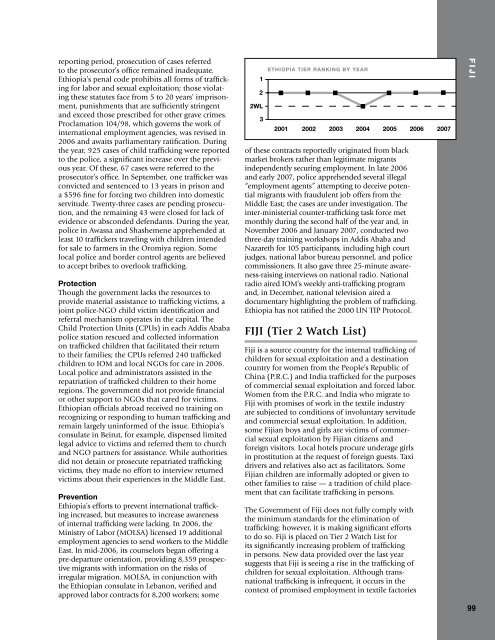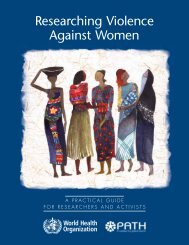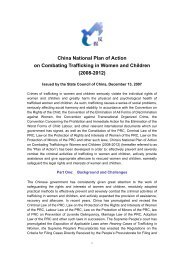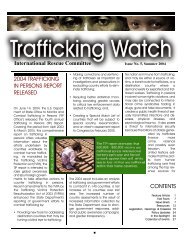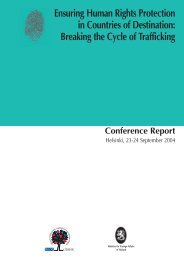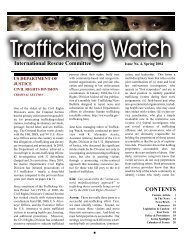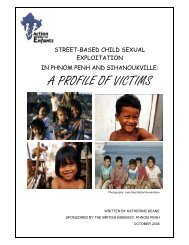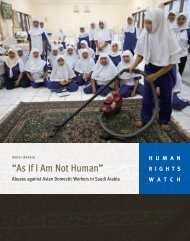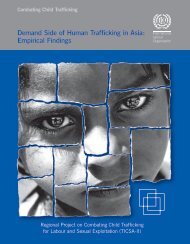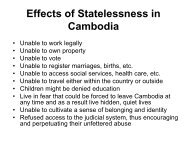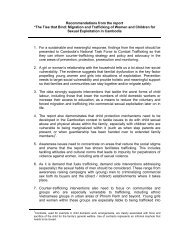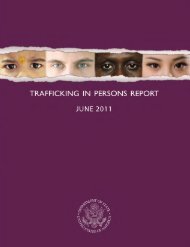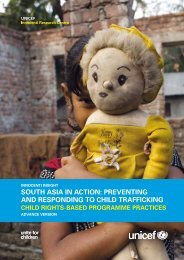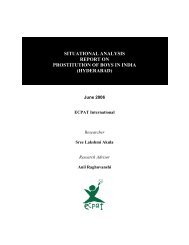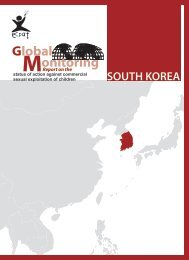2007 Trafficking in Persons Report - Center for Women Policy Studies
2007 Trafficking in Persons Report - Center for Women Policy Studies
2007 Trafficking in Persons Report - Center for Women Policy Studies
You also want an ePaper? Increase the reach of your titles
YUMPU automatically turns print PDFs into web optimized ePapers that Google loves.
eport<strong>in</strong>g period, prosecution of cases referred<br />
to the prosecutor’s office rema<strong>in</strong>ed <strong>in</strong>adequate.<br />
Ethiopia’s penal code prohibits all <strong>for</strong>ms of traffick<strong>in</strong>g<br />
<strong>for</strong> labor and sexual exploitation; those violat<strong>in</strong>g<br />
these statutes face from 5 to 20 years’ imprisonment,<br />
punishments that are sufficiently str<strong>in</strong>gent<br />
and exceed those prescribed <strong>for</strong> other grave crimes.<br />
Proclamation 104/98, which governs the work of<br />
<strong>in</strong>ternational employment agencies, was revised <strong>in</strong><br />
2006 and awaits parliamentary ratification. Dur<strong>in</strong>g<br />
the year, 925 cases of child traffick<strong>in</strong>g were reported<br />
to the police, a significant <strong>in</strong>crease over the previous<br />
year. Of these, 67 cases were referred to the<br />
prosecutor’s office. In September, one trafficker was<br />
convicted and sentenced to 13 years <strong>in</strong> prison and<br />
a $596 f<strong>in</strong>e <strong>for</strong> <strong>for</strong>c<strong>in</strong>g two children <strong>in</strong>to domestic<br />
servitude. Twenty-three cases are pend<strong>in</strong>g prosecution,<br />
and the rema<strong>in</strong><strong>in</strong>g 43 were closed <strong>for</strong> lack of<br />
evidence or absconded defendants. Dur<strong>in</strong>g the year,<br />
police <strong>in</strong> Awassa and Shashemene apprehended at<br />
least 10 traffickers travel<strong>in</strong>g with children <strong>in</strong>tended<br />
<strong>for</strong> sale to farmers <strong>in</strong> the Oromiya region. Some<br />
local police and border control agents are believed<br />
to accept bribes to overlook traffick<strong>in</strong>g.<br />
Protection<br />
Though the government lacks the resources to<br />
provide material assistance to traffick<strong>in</strong>g victims, a<br />
jo<strong>in</strong>t police-NGO child victim identification and<br />
referral mechanism operates <strong>in</strong> the capital. The<br />
Child Protection Units (CPUs) <strong>in</strong> each Addis Ababa<br />
police station rescued and collected <strong>in</strong><strong>for</strong>mation<br />
on trafficked children that facilitated their return<br />
to their families; the CPUs referred 240 trafficked<br />
children to IOM and local NGOs <strong>for</strong> care <strong>in</strong> 2006.<br />
Local police and adm<strong>in</strong>istrators assisted <strong>in</strong> the<br />
repatriation of trafficked children to their home<br />
regions. The government did not provide f<strong>in</strong>ancial<br />
or other support to NGOs that cared <strong>for</strong> victims.<br />
Ethiopian officials abroad received no tra<strong>in</strong><strong>in</strong>g on<br />
recogniz<strong>in</strong>g or respond<strong>in</strong>g to human traffick<strong>in</strong>g and<br />
rema<strong>in</strong> largely un<strong>in</strong><strong>for</strong>med of the issue. Ethiopia’s<br />
consulate <strong>in</strong> Beirut, <strong>for</strong> example, dispensed limited<br />
legal advice to victims and referred them to church<br />
and NGO partners <strong>for</strong> assistance. While authorities<br />
did not deta<strong>in</strong> or prosecute repatriated traffick<strong>in</strong>g<br />
victims, they made no ef<strong>for</strong>t to <strong>in</strong>terview returned<br />
victims about their experiences <strong>in</strong> the Middle East.<br />
Prevention<br />
Ethiopia’s ef<strong>for</strong>ts to prevent <strong>in</strong>ternational traffick<strong>in</strong>g<br />
<strong>in</strong>creased, but measures to <strong>in</strong>crease awareness<br />
of <strong>in</strong>ternal traffick<strong>in</strong>g were lack<strong>in</strong>g. In 2006, the<br />
M<strong>in</strong>istry of Labor (MOLSA) licensed 19 additional<br />
employment agencies to send workers to the Middle<br />
East. In mid-2006, its counselors began offer<strong>in</strong>g a<br />
pre-departure orientation, provid<strong>in</strong>g 8,359 prospective<br />
migrants with <strong>in</strong><strong>for</strong>mation on the risks of<br />
irregular migration. MOLSA, <strong>in</strong> conjunction with<br />
the Ethiopian consulate <strong>in</strong> Lebanon, verified and<br />
approved labor contracts <strong>for</strong> 8,200 workers; some<br />
of these contracts reportedly orig<strong>in</strong>ated from black<br />
market brokers rather than legitimate migrants<br />
<strong>in</strong>dependently secur<strong>in</strong>g employment. In late 2006<br />
and early <strong>2007</strong>, police apprehended several illegal<br />
“employment agents” attempt<strong>in</strong>g to deceive potential<br />
migrants with fraudulent job offers from the<br />
Middle East; the cases are under <strong>in</strong>vestigation. The<br />
<strong>in</strong>ter-m<strong>in</strong>isterial counter-traffick<strong>in</strong>g task <strong>for</strong>ce met<br />
monthly dur<strong>in</strong>g the second half of the year and, <strong>in</strong><br />
November 2006 and January <strong>2007</strong>, conducted two<br />
three-day tra<strong>in</strong><strong>in</strong>g workshops <strong>in</strong> Addis Ababa and<br />
Nazareth <strong>for</strong> 105 participants, <strong>in</strong>clud<strong>in</strong>g high court<br />
judges, national labor bureau personnel, and police<br />
commissioners. It also gave three 25-m<strong>in</strong>ute awareness-rais<strong>in</strong>g<br />
<strong>in</strong>terviews on national radio. National<br />
radio aired IOM’s weekly anti-traffick<strong>in</strong>g program<br />
and, <strong>in</strong> December, national television aired a<br />
documentary highlight<strong>in</strong>g the problem of traffick<strong>in</strong>g.<br />
Ethiopia has not ratified the 2000 UN TIP Protocol.<br />
FIJI (Tier 2 Watch List)<br />
Fiji is a source country <strong>for</strong> the <strong>in</strong>ternal traffick<strong>in</strong>g of<br />
children <strong>for</strong> sexual exploitation and a dest<strong>in</strong>ation<br />
country <strong>for</strong> women from the People’s Republic of<br />
Ch<strong>in</strong>a (P.R.C.) and India trafficked <strong>for</strong> the purposes<br />
of commercial sexual exploitation and <strong>for</strong>ced labor.<br />
<strong>Women</strong> from the P.R.C. and India who migrate to<br />
Fiji with promises of work <strong>in</strong> the textile <strong>in</strong>dustry<br />
are subjected to conditions of <strong>in</strong>voluntary servitude<br />
and commercial sexual exploitation. In addition,<br />
some Fijian boys and girls are victims of commercial<br />
sexual exploitation by Fijian citizens and<br />
<strong>for</strong>eign visitors. Local hotels procure underage girls<br />
<strong>in</strong> prostitution at the request of <strong>for</strong>eign guests. Taxi<br />
drivers and relatives also act as facilitators. Some<br />
Fijian children are <strong>in</strong><strong>for</strong>mally adopted or given to<br />
other families to raise — a tradition of child placement<br />
that can facilitate traffick<strong>in</strong>g <strong>in</strong> persons.<br />
The Government of Fiji does not fully comply with<br />
the m<strong>in</strong>imum standards <strong>for</strong> the elim<strong>in</strong>ation of<br />
traffick<strong>in</strong>g; however, it is mak<strong>in</strong>g significant ef<strong>for</strong>ts<br />
to do so. Fiji is placed on Tier 2 Watch List <strong>for</strong><br />
its significantly <strong>in</strong>creas<strong>in</strong>g problem of traffick<strong>in</strong>g<br />
<strong>in</strong> persons. New data provided over the last year<br />
suggests that Fiji is see<strong>in</strong>g a rise <strong>in</strong> the traffick<strong>in</strong>g of<br />
children <strong>for</strong> sexual exploitation. Although transnational<br />
traffick<strong>in</strong>g is <strong>in</strong>frequent, it occurs <strong>in</strong> the<br />
context of promised employment <strong>in</strong> textile factories<br />
F I J I<br />
99


